
Tiny Home Regulations in Oregon: The Complete Guide
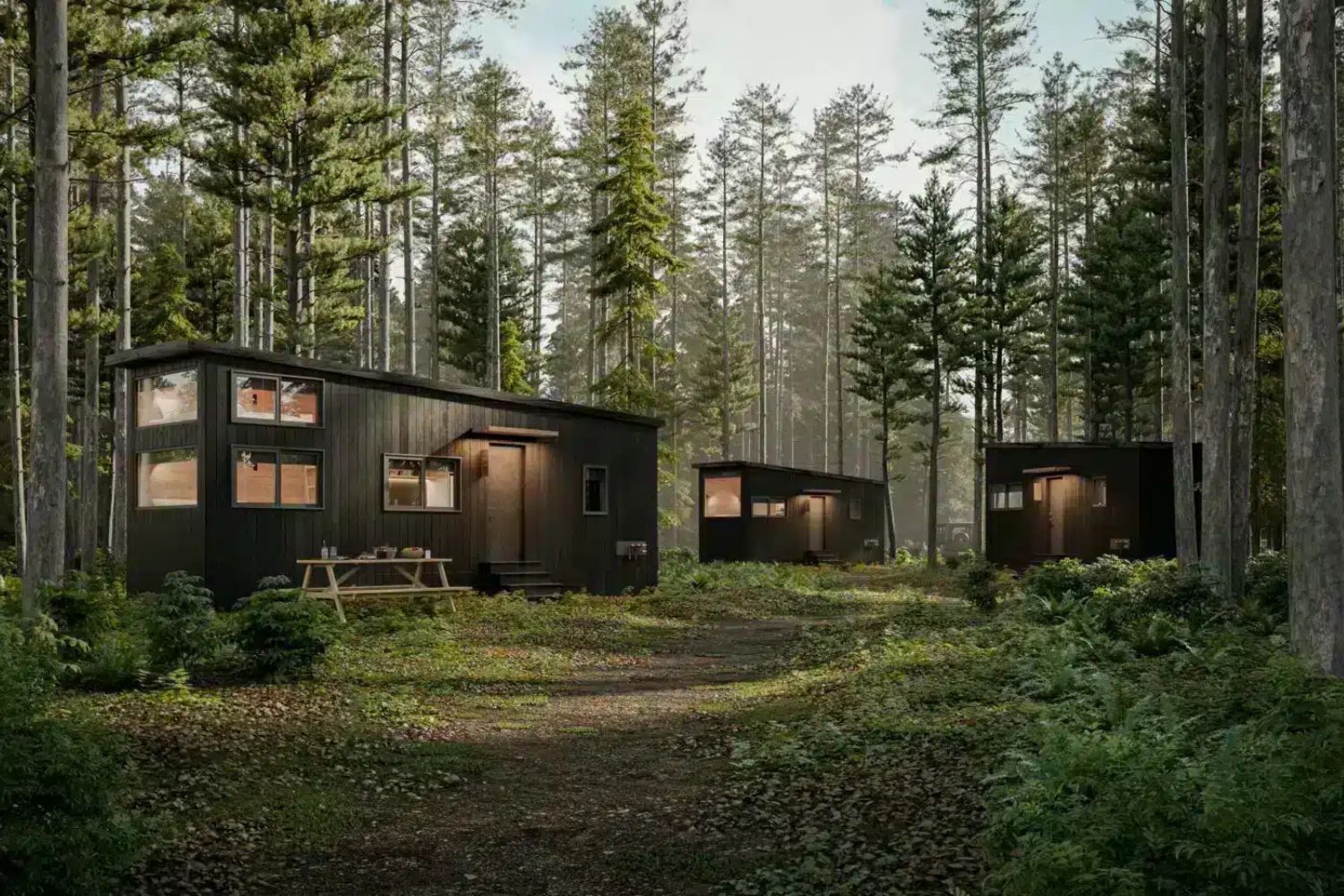
Are you dreaming of a forest retreat, an urban escape, or maybe both? Oregon could be the perfect place for your tiny dreams! However, Oregon’s laws for tiny homes might arrive at your doorstep to limit your dreams. Never fear! Here at Zook Cabins, we are happy to break down Oregon’s tiny home regulations so that you can take your tiny dream to Portland, Mt. Hood, and beyond!
The good news is that most tiny homes are completely legal in most areas of Oregon! From building to zoning code, county and city differences, and small home communities, we’ll explore everything you’ll want to know about tiny living in Oregon so that you can stop dreaming and start doing!
Are Tiny Houses Legal in Oregon?
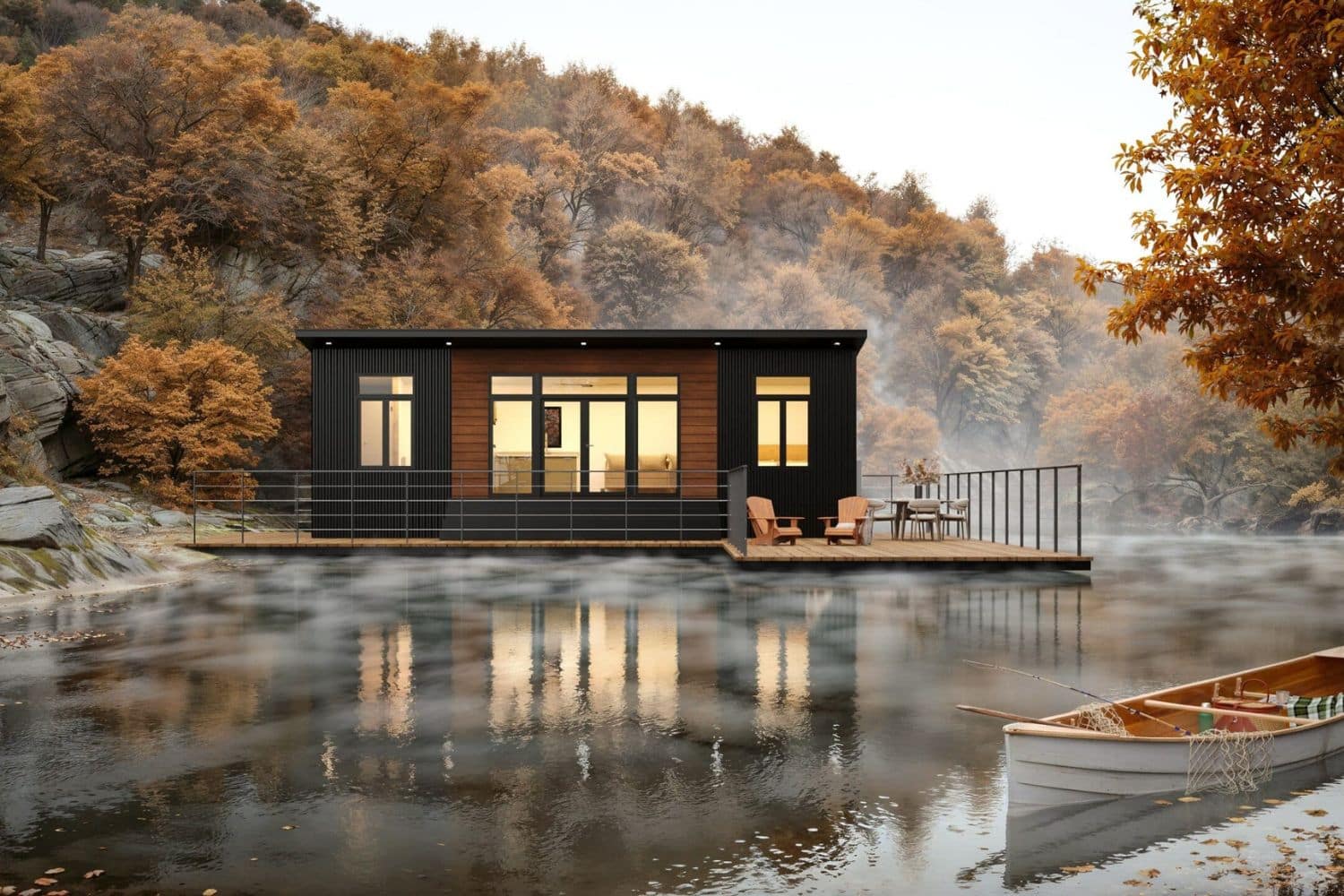
Yes! Tiny homes are legal in Oregon!
The state of Oregon has adopted the Oregon Residential Speciality Code (ORSC), which includes a small home specialty code. The Small Home Speciality Code requires that the 2018 International Residential Code (IRC), including but not limited to its Tiny Home Appendix Q, be used for the design and construction of tiny homes. The Small Home Speciality Code defines a smaller home as a single-family residence that is 400 sq ft or smaller.
Furthermore, the state of Oregon differentiates (and regulates accordingly) between three types of tiny homes. These are permanent tiny homes, temporary tiny homes, and transitional tiny homes. Permanent tiny homes are attached to an approved permanent foundation, temporary tiny homes are built on chassis or frames that can have wheels, and transitional tiny homes are living facilities for people without shelter. Each categorized tiny home has its own regulatory path that tiny home builders, developers, and consumers should be aware of.
Permanent tiny homes must meet Oregon’s state building code. The Oregon Residential Specialty Code (ORSC) permits one loft per tiny home smaller than 600 sq ft. A ladder is permitted for a loft, and an automatic fire sprinkler system is required. Permits are required for permanent tiny homes. Builders, electricians, and plumbers who work on an ORSC tiny home must be licensed by the state.
Tiny homes on wheels, such as the Zook Cabin Park Model tiny homes, are classified as temporary dwellings in Oregon, are usually attached to a frame or chassis, and can be mobile. In most areas of Oregon, temporary tiny homes may not be permanently affixed to land for use as a permanent dwelling unless located in a mobile home park. Temporary tiny homes are most frequently regulated by individual counties and cities and not by the state of Oregon. However, tiny homes that are designed for regular movement on public highways are subject to the Federal Motor Vehicle Safety Standards and are limited to a maximum width of 8.5 ft.
Are Park Models the Same Things As Tiny Homes?
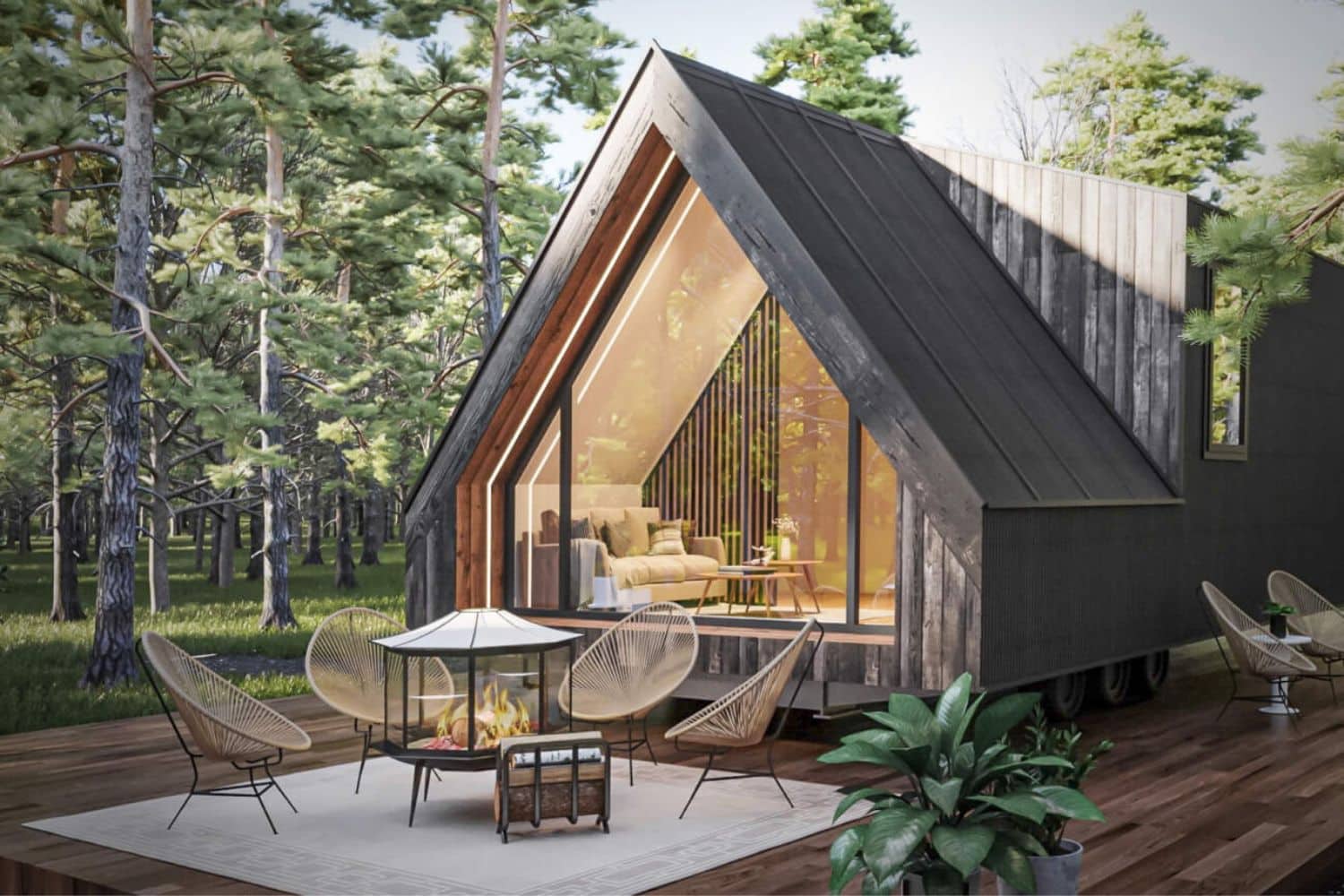
In some areas, park models are considered the same as tiny homes or THOWs. Usually, the distinction between tiny homes and park models depends on the specific area’s regulation definition. So, you might be asking yourself, What is a Park Model Home?
In general, a park model is a type of tiny home or recreational vehicle that is designed for long-term placement and residential use, usually in a mobile home park or campground. Park models are typically less than 400 sq ft, registered as an RV, mounted on wheels, use a single trailer chassis as their foundation, and have a seal of inspection from the RVIA. In most areas, park model homes are classified as recreational vehicles. Keep in mind that park model homes are not meant to be used for permanent housing.
On the other hand, a permanent tiny home is usually a home that is 400 square feet or less and is on a permanent foundation. Because of this difference, some municipalities will allow tiny homes but not park models since they are on wheels. Read more about this distinction with our complete article about the differences between park model homes and tiny homes here.
These differences are important to understand because park model-style tiny homes are most frequently regulated as recreational vehicles (RVs) in the state of Oregon, making it difficult to live permanently in a park-model tiny home throughout Oregon. However, tiny houses on a permanent foundation are regulated differently and allow Oregon tiny home enthusiasts a straightforward path toward tiny living!
One thing to keep in mind as you look at tiny homes is the difference in certification. The main certifications are RVIA and NOAH. To learn the difference between the two take a look at our blog RVIA Vs NOAH Tiny homes.
What Counties in Oregon Allow Park Model Tiny Homes?
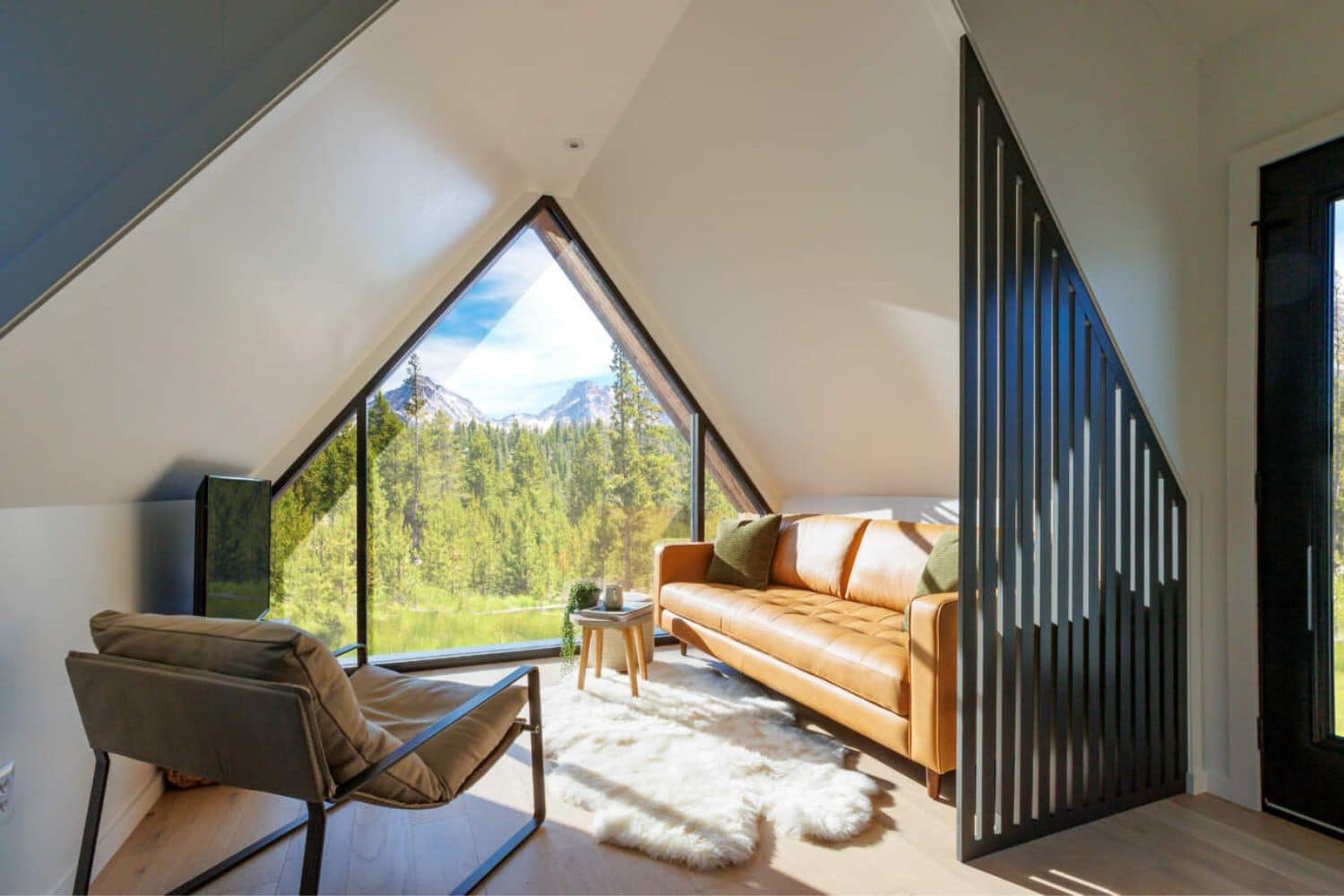
Does Baker County, Oregon allow tiny homes?
Yes. Tiny homes are permitted in Baker County, Oregon. Baker County regulates tiny homes and follows the Oregon Residential Specialty Code. Baker County’s Zoning regulations permit tiny homes through its Manufactured Home section. This means tiny houses are allowed in Baker County on or off a foundation, provided they follow the IRC’s Appendix Q and have installed appropriate fire safety measures. Check in with Baker County’s Building Department for a complete list of regulations!
Does Benton County, Oregon allow tiny homes?
Yes. Benton County, Oregon, allows tiny homes. Benton County has adopted the Oregon Residential Specialty Code (ORSC), which is based on the International Residential Code and permits tiny homes under its special small house code. Furthermore, Benton County has a very clearly outlined tiny home procedure that divides and defines tiny homes in the county. Park Model tiny homes in Benton County must be manufactured to the ANSI A119.5 Standard and be designed for temporary living quarters. Small dwellings, no larger than 400 sq ft, are permitted on private land in Benton County if they are built on a permanent foundation. For a complete list of the Benton County Tiny Home Procedures and all of Benton’s Building Codes, check in with Benton County’s Building Department.
Does Clackamas County, Oregon allow tiny homes?
Yes. Tiny homes are permitted in Clackamas County, Oregon. The county recently amended the Zoning and Development Ordinance to allow Accessory Dwelling Units in rural residential areas and tiny homes defined as recreational vehicles as second dwellings on specific urban and rural residential properties. Additionally, tiny homes are allowed in most cities throughout the county, as the State of Oregon’s adoption of the Small Home Specialty Code permits tiny houses that are under 400 sq ft and that meet all other requirements of the IRC and Appendix Q as well as the incorporation of residential fire sprinklers. Check your local zoning code to determine which zoned district your specific tiny homes are allowed in.
Does Clatsop County, Oregon allow tiny homes?
Yes. Tiny homes are allowed in Clatsop County, Oregon. Clatsop County has adopted the Oregon Residential Speciality Code (ORSC). The ORSC contains a Small Home Speciality Code, which regulates construction standards and fire mitigation standards for small homes throughout Oregon. However, each zoning district within Clatsop County may not allow every type of tiny home outlined by the ORSC. Check with the Clatsop County Zoning Ordinance to find out what tiny home is permitted in your area. Additionally, it’s a good idea to check in with your local city to see if your city’s zoning regulations differ from the county’s. For example, both Astoria and Warrenton, Oregon, permit tiny homes under their required cottage cluster development zone.
Does Columbia County, Oregon allow tiny homes?
Yes, tiny homes are allowed in Columbia County, Oregon. The county has adopted Oregon’s state building codes (ORSC), which permit tiny homes under its small home specialty code. This code, modeled off of the International Residential Code (IRC) regulations for tiny homes, permits homes that meet specific regulations, including loft and fire sprinkler rules. You can find those regulations through Columbia County’s Building Department. Be sure to check your local zoning laws, as not all types of tiny homes are allowed in every zoning district, and rules and regulations frequently differ by city and town.
Does Coos County, Oregon allow tiny homes?
Yes! Tiny homes are allowed in Coos County, Oregon. The Coos County Building Department has adopted the 2023 Oregon Residential Speciality Code (ORSC). The Small Home Speciality Code, as defined within it, permits tiny homes that meet certain specifications, including a fire sprinkler system, emergency escape windows, certain ceiling height and loft sizes, and utility requirements. Check the Coos County Zoning Code to determine if your tiny home is allowed in your area, as not all types of tiny houses are permitted in all areas throughout Coos County. Also, be sure to check in with your local city or town’s building department, as regulations sometimes differ by city or town.
Does Crook County, Oregon allow tiny homes?
Yes. Tiny homes are legal in Crook County, Oregon. Crook County has adopted the Oregon Residential Specialty Code (ORSC), which permits tiny homes that meet specific fire safety, size, and utility requirements. The ORSC also, in some cases, requires tiny houses to be allowed for use as accessory dwelling units and requires large cities to permit cottage clusters. Check Crook County’s Building Code for a complete understanding of their adopted version of the ORSC. Also, be sure to check their zoning code, as not all of the tiny homes defined by the ORSC are permitted in every zone throughout Crook County.
Does Curry County, Oregon allow tiny homes?
Yes. Tiny homes are permitted in Curry County, Oregon. Tiny Homes in Curry County are regulated by type of home. If the tiny home is built on a chassis with an axle, it is regulated as an RV in Curry County and must be registered with the Oregon Department of Motor Vehicles. Primarily, these homes should be placed in an approved RV park. Tiny homes built and licensed as manufactured homes and on a permanent foundation are subject to the same regulations as manufactured homes in the county. Site-built tiny homes are allowed so long as they comply with the Oregon Residential Specialty Code and include designated spaces for bathing, cooking, living, and sleeping.
A permit is required for both tiny homes classified as manufactured homes and site-built tiny homes. Check the Curry County Code for all applicable building and zoning ordinances. Also, be sure to check in with any more local governments, as laws and regulations can vary by city or town.
Does Deschutes County, Oregon allow tiny homes?
Yes. Tiny homes are legal in Deschutes County, Oregon. According to the Deschutes County Code, all tiny homes must have a permit and approved application through the Deschutes County Building Department before they can be built or placed in Deschutes County. Additionally, with the proper permit and approval from the county, tiny homes can also be used as accessory dwelling units (ADUs) in Deschutes County. Be sure to check in with your local city or town’s building department, as regulations can differ between municipalities within a county.
Does Douglas County, Oregon allow tiny homes?
Yes. Douglas County, Oregon, does allow tiny homes. As a part of its Building Code, Douglas County has adopted Oregon’s Residential Construction Code, which permits tiny homes in some zoned regions that meet fire safety, size, and utility requirements. To build a small house in Douglas County, Oregon, verify that the property is zoned for residential use and permits the type of tiny home you would like to place there. Additionally, ensure you have obtained a permit from the Douglas County Building Department or, depending on your type of tiny home, the Oregon Department of Motor Vehicles.
Does Gilliam County, Oregon allow tiny homes?
Yes. Tiny homes are permitted in Gilliam County, Oregon. As a primarily rural county, the county’s code is enforced for incorporated parts of the county by the City of Boardman’s Building Department. Boardman has adopted the Oregon Residential Speciality Code, which includes a specialty code for tiny and manufactured homes. A permit is required for all residential building projects in Gilliam County. Check Gilliam County’s Zoning and Land Development Ordinance to determine what kind of tiny home is permitted in your area!
Does Grant County, Oregon allow tiny homes?
Yes, Grant County, Oregon, does allow tiny homes. Grant County adheres to Oregon’s statewide building code, specifically for tiny houses, the Oregon Residential Specialty Code (ORSC). Grant County’s Planning Department manages the county’s land use and zoning ordinances with the ORSC. You can obtain an application and a permit to build or place a tiny home in Grant County through Grant County Planning. Check with your local city or town’s government to find out where tiny homes are allowed in your area, as zoning regulations can vary by location.
Does Harney County, Oregon allow tiny homes?
Yes. Tiny homes are permitted in Harney County, Oregon. Harney County’s Building Department enforces Oregon’s Residential Specialty Code, which permits tiny homes in some instances and certain zoned areas. A permit is required to build or place a tiny home in Harney County. This permit can be obtained through Harney County’s Building Program. Harney County’s Zoning Ordinance permits tiny homes to be used as accessory dwelling units. In some areas in Harney County, tiny homes are only permitted in manufactured home and recreational vehicle parks. So be sure to check Harney County’s Zoning Ordinance and any local regulations to ensure your tiny home is allowed in your area.
Does Hood River County, Oregon allow tiny homes?
Yes, Hood River County, Oregon, does allow tiny homes. Hood River County Building Services enforces compliance with Oregon State Building Codes and processes permits for buildings within the county. Oregon’s State Building Code does permit tiny homes, so long as those tiny homes meet specific building and certification standards— in most cases, road compliance for tiny homes with wheels, county utility connection, and fire and emergency escape specifications.
Additionally, Hood River County’s zoning ordinance outlines which districts allow tiny homes in the county. Check both the building code and Hood River County’s zoning code to determine exactly what specifications your tiny home must meet. Also, be sure to check with your local town or city’s government, as laws and regulations can differ throughout a county. For example, Hood River City has its own zoning code, which can be found here.
Does Jackson County, Oregon allow tiny homes?
Yes. Tiny homes are allowed in Jackson County, Oregon. Jackson County’s Building Division administers the State of Oregon’s Residential Speciality Code, including its code for small homes. This means that tiny homes on a foundation are subject to residential building codes. In contrast, temporary tiny homes are subject to mobile home or recreational vehicle regulations and are permitted in only specific zoning areas, which vary by county and city. Homes should meet size and height requirements as well as contain appropriate utility connections and emergency escape and fire safety measures.
A permit is required to build or place a tiny home in Jackson County. Check with Jackson County’s Permit Services to determine which permits you will need for your tiny home and where you can apply for one!
Does Jefferson County, Oregon allow tiny homes?
Yes, tiny homes are permitted in Jefferson County, Oregon. Jefferson County’s Community Development upholds and enforces Oregon’s Building Code, the Oregon Residential Specialty Code (ORSC), which permits tiny homes that meet specific size, utility, and fire safety requirements. Permits are required to build or place a small house in Jefferson County, and permits in Jefferson County are completed at the state level for most parts of the county. Tiny homes are also allowed for use as accessory dwelling units in all parts of the county except for the Madras Urban Reserve Area. Be sure to check your local area’s building department, as regulations sometimes differ between cities or towns and may be separate altogether in larger cities in the county.
Does Josephine County, Oregon allow tiny homes?
Yes! Tiny homes are legal in Josephine County, Oregon. Josephine County’s Building Safety Division enforces versions of the International Residential Code and the Oregon Residential Speciality Code, both of which permit tiny homes that meet certain specifications. Josephine County’s county seat, Grants Pass, also specifically outlines how small homes are allowed in the city, county, and state.
There is no explicit minimum house size in the building code; however, because the code requires residential homes to have certain minimum elements like separate kitchens, bathrooms, and living spaces, there is a functional minimum floor area of 120 sq ft.
Manufactured homes are required to be allowed on any lot that permits a site-built single-family home. Tiny homes on wheels are permitted everywhere recreational vehicles are so long as they are connected to county water, electrical, and sewage systems.
Check your local area’s building and planning department for localized tiny home regulations!
Does Klamath County, Oregon allow tiny homes?
Yes! Klamath County, Oregon, does allow tiny homes. Klamath County enforces Oregon’s State Building Code, which permits tiny homes that meet certain regulations. Tiny homes are differentiated by type, permanent or temporary, but generally, they are allowed in most cases as long as they meet size, utility, and fire safety requirements. Klamath County has its own special measure for manufactured dwellings, which certain tiny homes (homes that are built off-site or have a chassis) are classified as. Manufactured dwellings in Klamath County require specific documentation, permits, and tags approved by the Klamath County Tax Office. These must be approved before placing or moving a tiny home in Klamath County.
Does Lake County, Oregon allow tiny homes?
Yes. Lake County, Oregon, does allow tiny homes. Lake County’s Building Department uses the current state of Oregon Code to regulate residential building projects, including tiny homes. A permit is required to build or place a tiny home in Lake County. Tiny homes in Lake County should have utility connections to county electrical, water, and sewage systems. Homes should also have an emergency egress window and, in some cases, an automatic sprinkler system. Check Lake County’s Zoning Ordinance to determine what other regulations your tiny home must abide by in your specific location.
Does Lane County, Oregon allow tiny homes?
Yes, some, but not all, tiny homes are permitted in Lane County, Oregon. Lane County Building Safety Department differentiates between permanent, temporary, and transitional tiny homes. Permanent tiny homes are homes attached to an approved foundation built either on-site or in an approved and licensed facility. These tiny homes are permitted in Lane County as long as they meet Oregon Building Codes. Lane County considers tiny homes attached to a frame or chassis with or without wheels temporary. Temporary dwellings can not be permanently placed on any land in the county. They are considered vehicles and should be approved and licensed by the Oregon Department of Transportation.
A permit is required to place or build a tiny home in Lane County. Temporary tiny homes are permitted for use as transitional homes and are also allowed inside recreational vehicle parks. Otherwise, all tiny homes should comply with land use laws and zoning ordinances throughout the county. Check your local city or town’s planning and building department, as zoning frequently varies within a county.
Does Lincoln County, Oregon allow tiny homes?
Yes. Tiny homes are allowed in Lincoln County, Oregon. The county’s Building Division enforces Oregon’s State Building Code, which permits tiny homes that meet specific size, utility, and fire safety measures. A permit is required in Lincoln County before building or placing a tiny home. Some cities in Lincoln County, like Lincoln City, promote tiny home developments that allow tiny homes to be placed at a higher density than other residential buildings. Check your local area to determine if there are any specific tiny home laws for your part of Oregon.
Does Linn County, Oregon allow tiny homes?
Yes, Linn County, Oregon, does allow tiny homes. Linn County has adopted the state of Oregon’s guidelines for tiny, manufactured, and mobile homes, meaning that tiny houses are likely permitted in some form in most parts of the county. While Linn County’s codes provide general building regulations, specific provisions for tiny homes do not exist. For comprehensive information, contacting the Linn County Planning & Building Department directly is a good idea.
Does Malheur County, Oregon allow tiny homes?
Yes. Tiny homes are permitted in Malheur County, Oregon. Malheur County has adopted Oregon’s residential code, including its appendix for tiny homes and special codes for manufactured and mobile homes. This means tiny houses are permitted in the county as long as they meet specific utility and safety requirements.
Not all tiny homes are allowed in all areas. Malheur County’s Zoning Code designates certain tiny homes in certain areas, so be sure to check that your kind of tiny home is permitted in your area of Malheur County. For example, tiny homes on wheels in most areas of Malheur County are only allowed for seasonal use on campgrounds or RV parks. Be sure to check your local area’s planning and building department, as regulations frequently differ by city or town within a county. Check in with Malheur County’s Planning and Zoning Department with any questions!
Does Marion County, Oregon allow tiny homes?
Yes! Tiny homes are allowed in Marion County, Oregon. Tiny homes on wheels are not permitted for use as permanent residences. If a tiny home is not on wheels, it can be used as a permanent residence as long as it follows all other relevant regulations for residential structures in the area where it is located. Tiny homes on wheels may be allowed in certain areas in Marion County. For example, depending on the location, they could be permitted in mobile homes or manufactured park areas when they are properly anchored and skirted. Tiny homes not on wheels are allowed as accessory dwelling units in Marion County.
Check out Marion County’s Planning & Zoning Division to ensure your tiny home meets all relevant planning and zoning regulations, and check in with your local building department, as tiny home regulations frequently differ by city or town within Marion County.
Does Morrow County, Oregon allow tiny homes?
Yes, tiny homes are allowed in Morrow County, Oregon. Tiny homes classified as permanent residences are permitted anywhere residential buildings are allowed as long as they follow regulations for those residential buildings. Tiny homes classified as temporary residences likely have wheels or a chassis and frame and, depending on the kind and the area, are permitted in mobile home or manufactured parks, or anywhere RVs are permitted. Check in with Morrow County’s Building Department and your local building department for a list of regulations that are most relevant to you!
Does Multnomah County, Oregon allow tiny homes?
Yes! Multnomah County, Oregon, does allow tiny homes. Predominantly regulated by the City of Portland, tiny homes in Multnomah County are differentiated and regulated in two main categories–tiny homes on wheels and permanent tiny homes. Tiny homes on wheels are regulated in the same way as occupied recreational vehicles. These homes are permitted in residential zones and should be on a residential lot with another house or manufactured home. Tiny homes on a foundation or with wheels removed and permanently affixed to land should be located in mobile home parks or should comply with normal residential zoning regulations.
Contact Multnomah County’s Land Use Planning Division for clarification on tiny home and residential rules. All tiny homes should meet city and county utility requirements, and a permit is required to build or place a tiny home in Multnomah County.
Does Polk County, Oregon allow tiny homes?
Yes, tiny homes are allowed in Polk County, Oregon. Tiny houses are considered manufactured structures in Polk County. A permit is required to build or place a small home in Polk County. Polk County has adopted Oregon’s building code, which regulates both tiny and manufactured homes and permits those that meet its regulations in certain areas. Find permit information and regulations through Polk County’s Building Division. Be sure to also check in with your local city or town’s building department, as regulations can differ between areas within a county.
Does Sherman County, Oregon allow tiny homes?
Yes. It is likely that Sherman County, Oregon, allows tiny homes. While Sherman County’s planning department does not have any specific regulations for tiny homes and has not revised their zoning or land use codes in a few decades, the county has adopted the Oregon Residential Speciality Code. This code permits tiny homes, classified as manufactured homes, and is based on the International Residential Code, which outlines specific regulations for tiny homes. A permit is required to build or place a tiny home in Sherman County. Contact the Sherman County Planning Department or your more local building or planning department for the complete list of regulations for your new tiny home!
Does Tillamook County, Oregon allow tiny homes?
Yes, tiny homes are permitted in Tillamook County, Oregon. Tiny homes are allowed under the same criteria as mobile homes, manufactured homes, and recreational vehicles. A permit is required to build or place these homes in Tillamook County. Tiny homes should be anchored with tie-downs and skirted or attached to a permanent foundation if placed in Tillamook County. View all Tillamook’s specific regulations for tiny homes here, or contact Tillamook County’s Building Department for more information!
Does Umatilla County, Oregon allow tiny homes?
Yes. Tiny homes are allowed in Umatilla County, Oregon. Tiny houses may not be permitted in every zoned district in Umatilla County. Check Umatilla’s zoning map to ensure your small home is allowed in your area. Otherwise, tiny houses are permitted as long as they are attached to county-required utilities. A building and zoning permit is required before a tiny home may be built or placed in Umatilla County. Contact Umatilla’s Planning Division for a complete list of regulations.
Does Union County, Oregon allow tiny homes?
Yes. Tiny homes are permitted in Union County, Oregon. Tiny homes are regulated under manufactured, mobile home, and recreational vehicle regulations. These regulations permit tiny homes in most areas as long as they are properly secured and connected to appropriate county utilities. Tiny homes are allowed for use as accessory dwelling units in major cities in Union County. Contact the Union County Planning Department with any questions or view their complete zoning code! Be sure to reach out to your local governments to discover if there are any more local tiny home regulations!
Does Wallowa County, Oregon allow tiny homes?
Yes. Tiny homes are allowed in Wallowa County, Oregon. However, only some tiny homes are permitted in some areas. Tiny homes on wheels are considered Recreational Vehicles (RVs) and are not allowed outside recreational vehicle or mobile home parks unless modified to meet mobile or manufactured home codes.
In most cases, the tiny homes that are allowed in Wallowa County are stick-built homes or tiny homes attached to a foundation. These permanent tiny homes should meet all codes for residential structures in their zoned area. Contact the Wallowa County Building Department for the most up-to-date regulations for your area. Or, reach out to your local city or town’s planning division for local tiny home laws!
Does Wasco County, Oregon allow tiny homes?
Yes. Tiny homes are permitted in Wasco County, Oregon. Tiny houses in Wasco County must have intact exterior walls and roof structure, indoor plumbing consisting of a kitchen sink, toilet, and bathing facilities connected to a sanitary waste disposal system, interior wiring for interior lights, and a heating system.
Tiny homes on a chassis with an axle are regulated as Recreational Vehicles in Wasco County and are not permitted for permanent use. There are no minimum size requirements for residences in Wasco County. Read Wasco County’s complete statement on tiny homes or contact the Wasco County Planning Department with any questions.
Does Washington County, Oregon allow tiny homes?
Yes! Tiny homes are allowed in Washington County, Oregon. Washington County designs and regulates tiny homes using Appendix Q of the International Residential Code. This appendix defines tiny homes as dwellings that are 400 sq ft or less in floor area. Tiny homes that meet the regulations in Appendix Q are generally allowed in unincorporated Washington County, wherever a dwelling is permitted. Tiny homes are allowed for use as primary dwellings or as accessory dwellings. Tiny homes on wheels are classified as Recreational Vehicles (RVs) across the state of Oregon and are only permitted for temporary use in Washington County.
Tiny homes within incorporated parts of Washington County, for example, in the Portland metropolitan area, should follow their local city or town’s building and planning regulations. Find Washington County’s statement on tiny homes here or contact Washington County’s Building Services with any remaining questions.
Does Wheeler County, Oregon allow tiny homes?
Yes, tiny homes are allowed in Wheeler County, Oregon. Permits are required to build or place a small home in Wheeler County. Tiny homes should be placed on a foundation that meets state building codes, and/or the tiny homes should be skirted. All plumbing, electrical, and other county-required utilities should be connected to the home. Tiny homes should be constructed with material that matches the exterior of other residential buildings in the district they are placed in. Check out Wheeler County’s Zoning Ordinance for a complete list of regulations, or contact Wheeler County’s Land Use Planning Division with any questions!
Does Yamhill County, Oregon allow tiny homes?
Yes! Yamhill County, Oregon, does allow tiny homes! Tiny houses should be no smaller than 400 sq ft, and all homes should be on a foundation. Tiny homes require a building permit to be built or placed within the county. Tiny homes on wheels are not considered permanent dwellings in incorporated parts of Yamhill County and are permitted on a temporary basis where Recreational Vehicles (RVs) are allowed. Check out Yamhill’s Planning and Development Department for a full building and permit regulations list! Or, read the County Seat’s page on the planning department’s common questions.
Find Your Park Model Tiny Home Regulations in Oregon by Municipality
| Eugene | Lane County Tiny Homes |
| Gresham | Gresham ADUs |
| Hillsboro | Hillsboro City Code |
| Portland | ADUs & THOWs (RVs) |
| Salem | Salem Land Use & Zoning |
| Turner | Turner Zoning |
Does Eugene, Oregon allow tiny homes?
Yes! Tiny homes are allowed in Eugene, Oregon. Tiny homes in Eugene are defined as dwelling units of 400 sq ft or less that contain a living area, kitchen, bathroom, and bedroom. Small homes in Eugene are allowed in every zoned district except for commercial and industrial zones. These homes should be on a foundation and connected to electrical and plumbing county utilities. A permit is required to build or place a tiny home in Eugene. View the city’s Zoning and Land Use Plan or Lane County’s Tiny Homes Safety Page for more information.
Does Gresham, Oregon allow tiny homes?
Yes. Tiny homes are allowed in Gresham, Oregon. However, tiny houses on wheels are only permitted in the city how and where recreational vehicles are. Permanent tiny homes are allowed in Gresham so long as they are on a foundation, connected to city utilities, and following all other residential dwelling regulations. Contact the city of Gresham’s Planning Department for a complete list of rules.
Does Hillsboro, Oregon allow tiny homes?
Yes. Hillsboro, Oregon, does allow tiny homes. Hillsboro’s community development code outlines possibilities for accessory dwelling units and cottage clusters. Tiny homes are also allowed in the city if they are on a parent foundation and follow regulations for residential dwellings in the district they are placed in.
Does Portland, Oregon allow tiny homes?
Yes. Much like the state’s tiny home regulations, Portland, Oregon, does allow tiny homes. Tiny homes are classified and regulated in two main ways. Permanent tiny homes are homes that are attached to an approved foundation. Temporary tiny homes are those with a chassis or wheels. In general, permanent tiny homes are allowed throughout the city as long as they follow the residential regulations for the zoned area in which they are placed.
Temporary tiny homes are allowed for permanent use in some parts of Portland. Tiny homes on wheels are permitted in addition to a primary dwelling on a residential lot. These homes must be permanently connected to water and sewer systems. These homes should also meet fire and safety standards and include an emergency escape window. Tiny homes are also allowed to be used as accessory dwelling units. Contact Portland’s Permitting & Development Center for permit applications and complete city regulations.
Does Salem, Oregon allow tiny homes?
Yes. Tiny homes are permitted in Salem, Oregon. Tiny homes on wheels are not considered permanent residences and should only be parked or placed in recreational vehicle parks or campgrounds. Tiny houses on a foundation or removed from wheels are allowed in Salem so long as they follow the regulations for residential or accessory dwelling units in the zoned district they are placed in. Check with Salem’s Land Use & Zoning Department for more information or with Marion County’s Planning Division.
Does Turner, Oregon allow tiny homes?
Yes. Tiny homes are allowed in Turner, Oregon. Residential dwellings in Turner have no minimum size requirement, meaning that tiny houses on a foundation are permitted anywhere residential structures are allowed, provided they also follow all residential requirements. Accessory dwelling units are permitted in Turner, Oregon, as well. Tiny homes on wheels are only allowed in recreational vehicle parks in Turner, Oregon. Contact Turner’s Planning Department for their complete zoning code.
What Counties in Oregon Don’t Allow Park Model Tiny Homes?
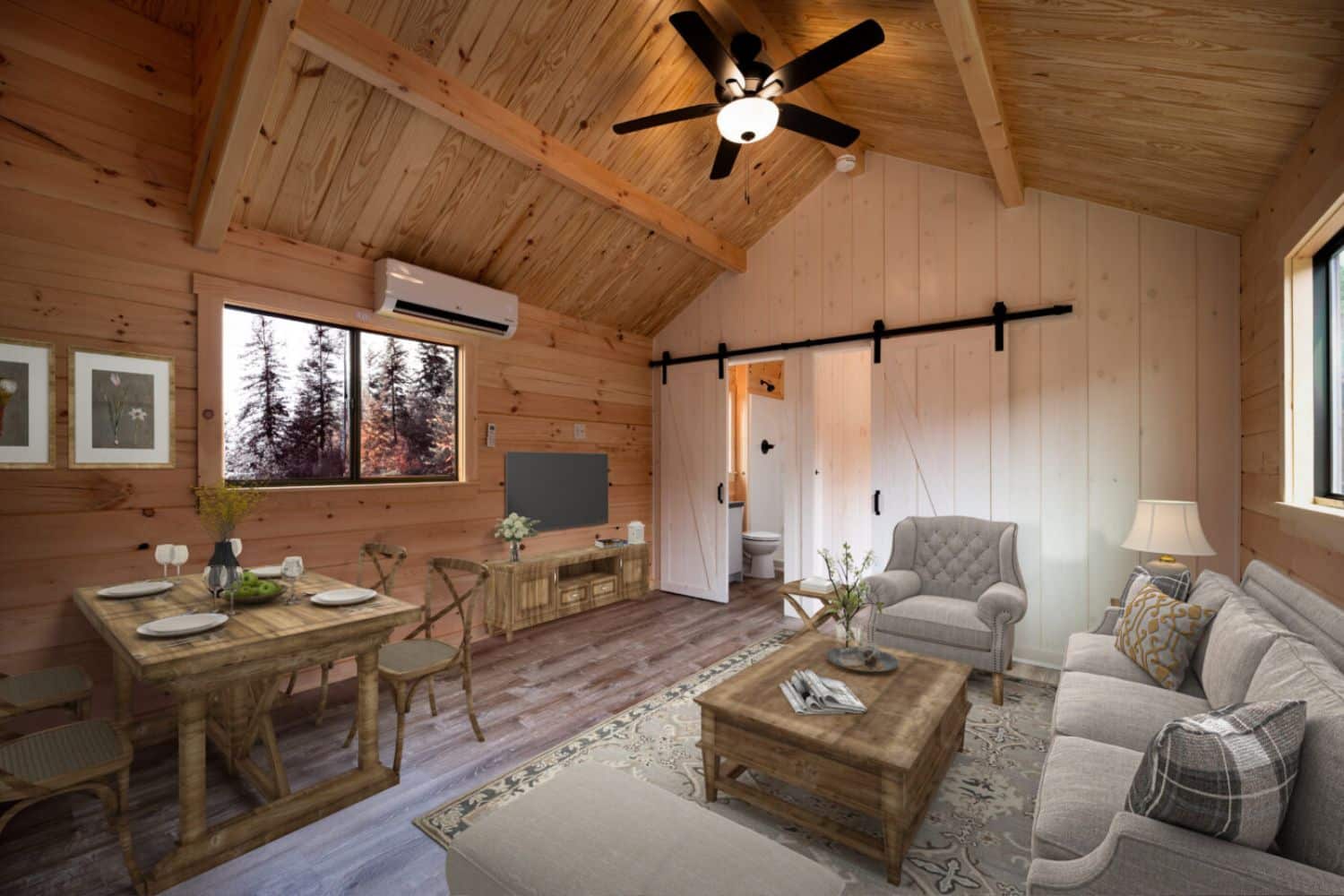
Good news! Every county in Oregon allows tiny homes in some form and in some areas. Park model tiny homes are most frequently permitted where recreational vehicles are. Otherwise, throughout the state, permanent tiny homes are allowed anywhere residential buildings are, provided they follow the regulations for residences in the zoned area they are placed in.
Park Model Tiny Homes That Are Allowed in Oregon
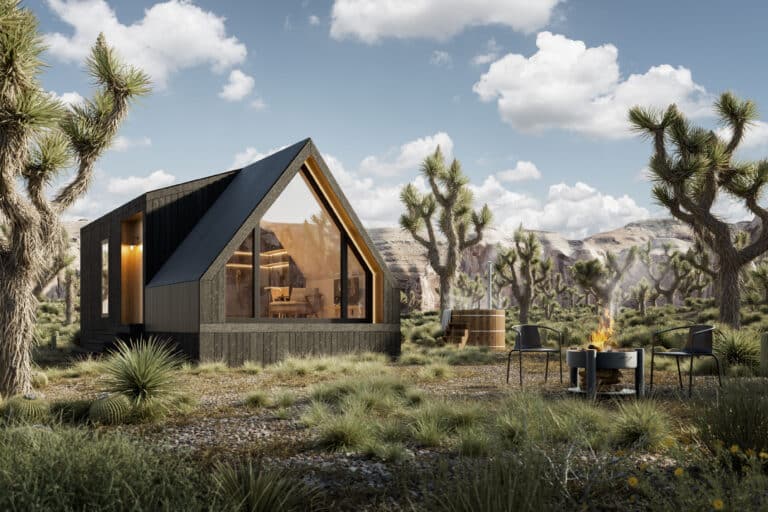
The A-Frame
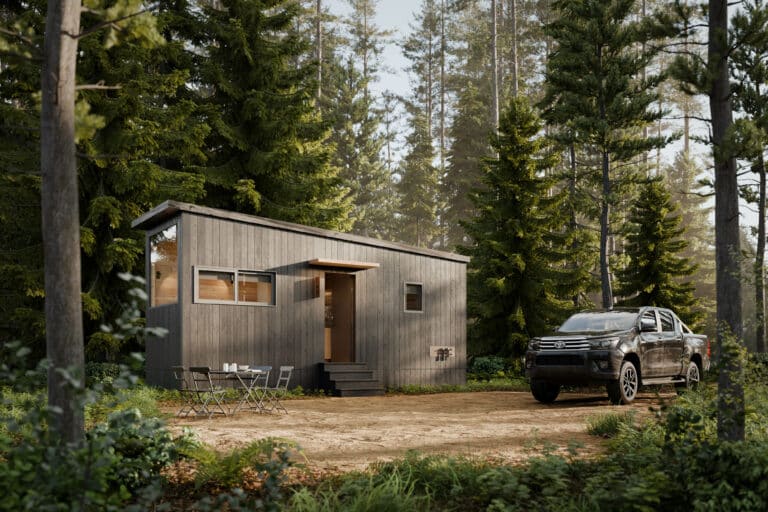
The Nook Studio
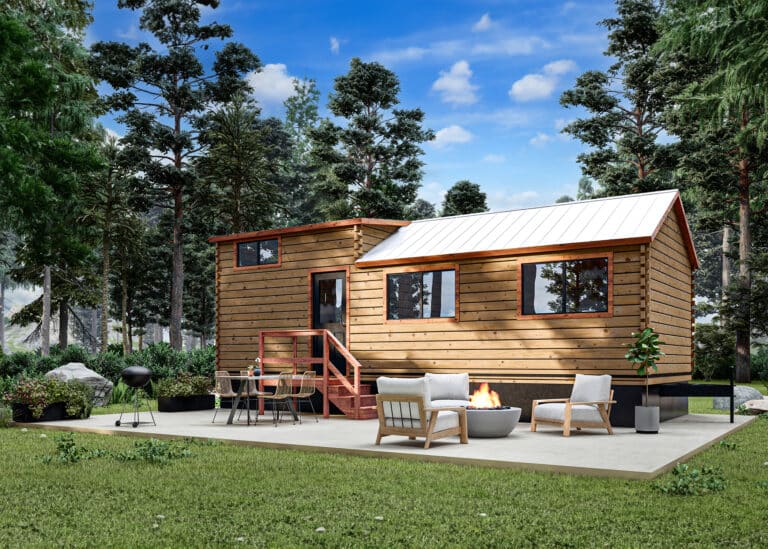
The Pinecrest
Park Model Regulations in Oregon
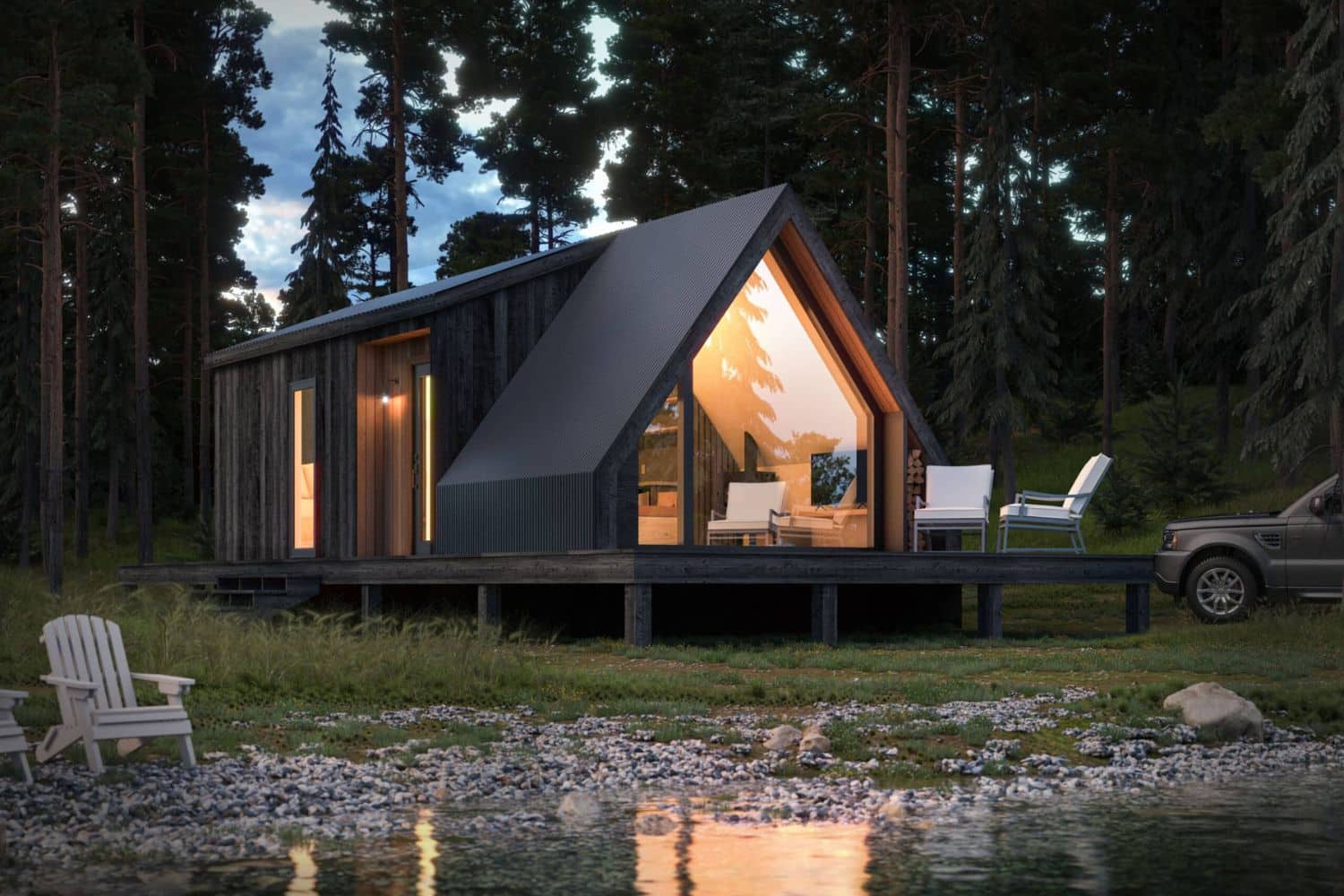
Can I Live in A Park Model Tiny Home in Oregon?
Yes! Park model tiny homes in Oregon are usually regulated in similar ways to recreational vehicles. This means that, in most areas, temporary tiny homes are permitted in manufactured dwelling parks, mobile home parks, RV parks, and other places where multiple temporary structures are sited. Local governments regulate where and how long temporary structures may be located. Notably, park model tiny homes are permitted for use as permanent residences in Portland, Oregon!
Can Park Model Tiny Homes Be Used As An ADU in Oregon?
Permanent tiny homes in Oregon are permitted as single-family residences or as accessory dwelling units (ADUs). ADUs must be permitted in Oregon cities with populations greater than 2,500 and counties with populations greater than 15,000. Park model tiny homes are only permitted for use as ADUs in some, but not all, areas in Oregon. For example, Portland and Salem permit park model tiny homes for use as ADUs. It’s always best to check with your local building or zoning department to find out if your local zoning ordinance permits you to use your park model tiny home as an ADU.
Do You Need A Permit For Tiny Homes in Oregon?
Yes! In most areas in Oregon, you will need a building and/or a zoning permit to build, place, or live in a tiny home in Oregon. In general, tiny houses on wheels will also need to be registered with Oregon’s Department of Motor Vehicles. To find the complete list of building permit requirements for your location, check in with your local government’s office to find the building laws and permit requirements.
Are There Any Tiny Home Communities in Oregon?
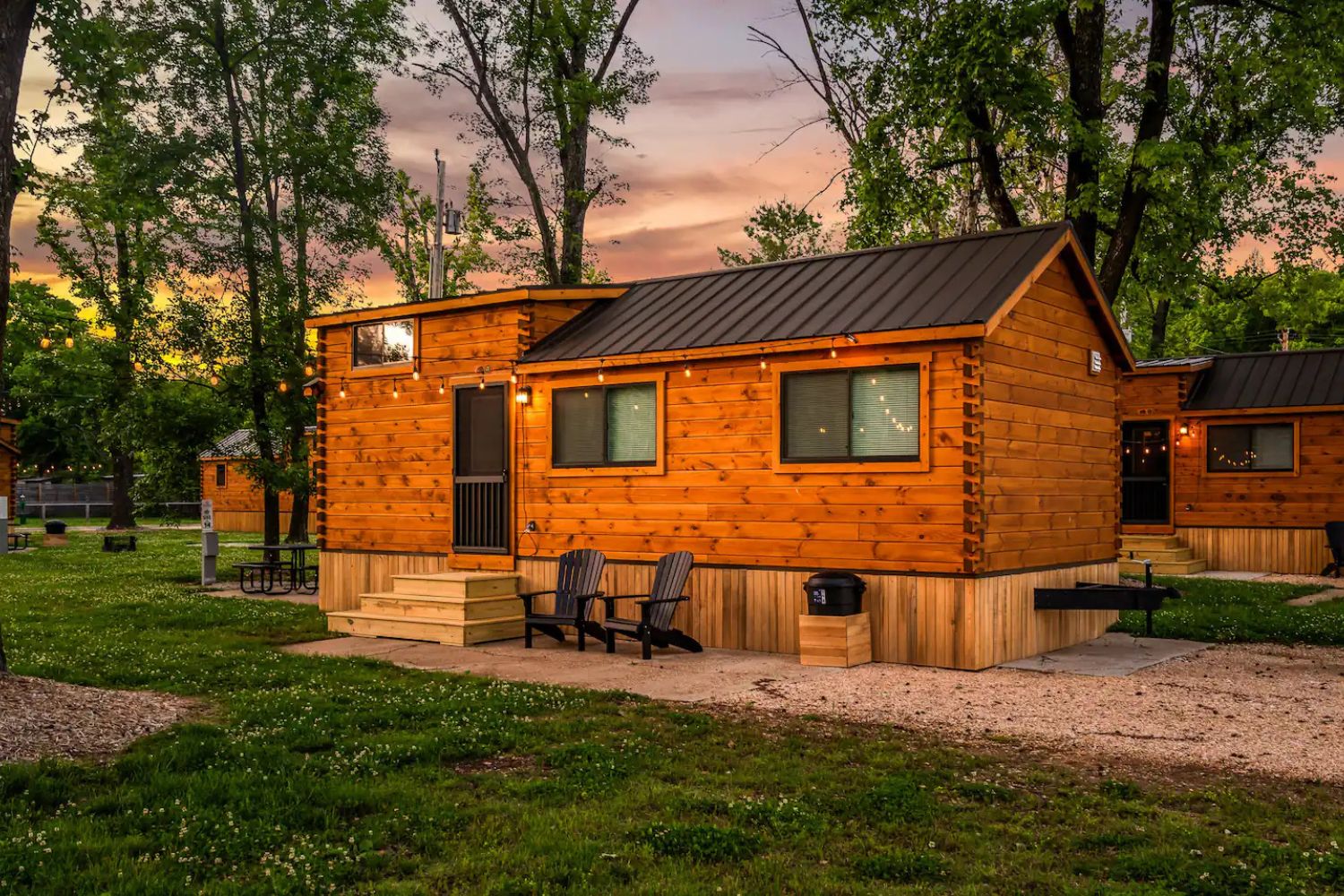
Yes! There are so many tiny home communities in Oregon to explore! Staying at or visiting these communities is a great way to try out tiny living in Oregon before purchasing a tiny home of your own.
Have you already decided to buy a tiny home? Then consider placing it in a tiny home community! Tiny home communities are a great way for residents to access amenities and support systems like community gardens, rec centers, general stores, and more! Plus, tiny home communities are generally more affordable than city living!
Emerald Village Eugene, 25 N. Polk St, Eugene, OR: Check out Oregon’s first permanently affordable tiny home co-op in Eugene, OR. Built to create democratic communities in affordable and environmentally sustainable ways, Emerald Village’s goal is to build a world where everyone lives with dignity! This community features a community clubhouse, kitchen, and laundry room!
Hope Valley Resort, 8372 Enchanted Way SE, Turner, OR: The lifestyle of your dreams potentially waits for you in this tiny home community that seeks to pair luxurious living with sustainability. These small cottages have a tiny carbon footprint but a big impact! The community also features a community lodge, exercise facility, hot tub, swimming pool, tennis, pickleball, and basketball courts, trails, a dog park, a garden, and more!
Mt. Hood Tiny House Village, 65000 E. Hwy 26, Welches, OR: The Tiny House Village at Mt. Hood is a great option for those who want to engage with both the wildness and city life of Portland! Immerse yourself in the nature of the Pacific Northwest while being less than an hour from Portland!
My Tiny House Village, Sherwood, OR: Just south of Portland, explore all that Sherwood, Oregon has to offer! Designed to inspire tiny home communities, this community is a great choice for those looking for a perfect, tiny Northwest excursion. Equipped with several amenities and booking options, try out a tiny house here!
Tiny Tranquility, 4399 SW Eriksen Ave, Waldport, Oregon: Tiny Tranquility is a park developed exclusively for Tiny Homes and Vintage RVs with sites available for use as nightly or long-term rental sites! These sites are intended for long-term rental and contain utility hookups. Tiny Tranquility offers amenities such as a dog park, an outdoor activity area complete with fire pits, an entertainment center and community space, and a greenhouse.
Frequently Asked Questions About Oregon Tiny House Laws
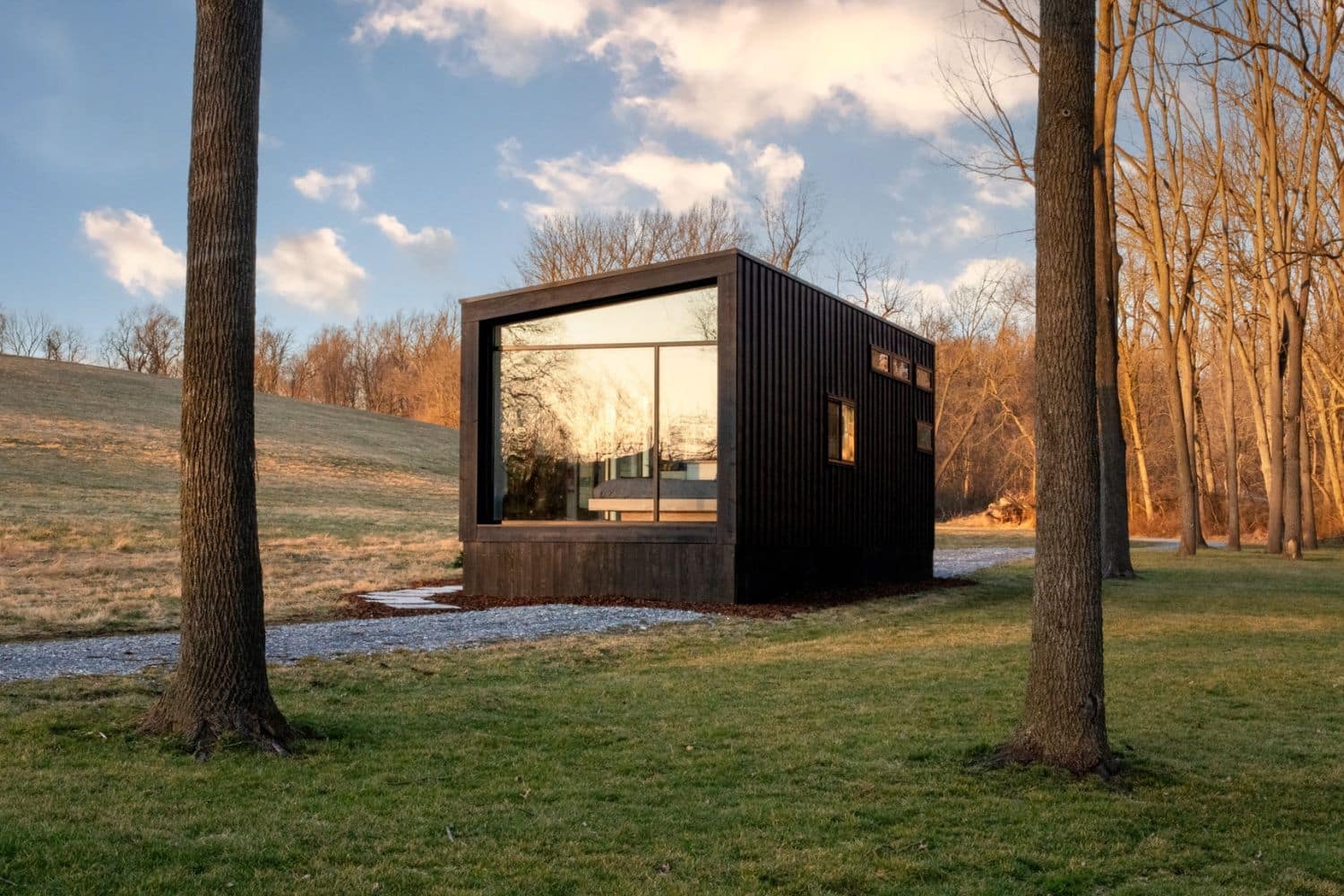
Can I Put a Tiny House on My Property in Oregon?
Yes. In most, but not all, places in Oregon, you can place a tiny home on your property. If the tiny home is placed on a property that already has a home, then this secondary home is known as an accessory dwelling unit, or ADU. Most, but not all, counties in Oregon allow tiny homes to be used as ADUs. Additionally, only some places, such as Portland, allow tiny homes on wheels for use as secondary residences on a property. Check your local county or city building and zoning code to determine if a small house is allowed on your property in Oregon.
What is the Small Home Specialty Code in Oregon?
Oregon’s small home specialty code is a set of regulations with the Oregon Residential Specialty Code, which applies specifically to single-family homes that are 400 sq ft or less in size. This code is based on the International Residential Code’s Appendix Q. It requires tiny homes to meet certain regulations, such as having heat detectors, fire sprinklers, and utility connections. Check the code for a complete list of all the rules your Oregon tiny home should follow.
How Much Does it Cost to Build a Tiny House in Oregon?
Tiny houses in Oregon can cost from under $8,000 to over $100,000 to build, depending on the size and amenities you desire in your tiny home! Of course, you will need land to place your tiny home on as well, and, in most places, you will need to pay for a permit for your home. These and other additions will add to the cost of your tiny home in Oregon. If you’re interested in an example of what a tiny home might cost, check out our cost breakdown of park model tiny homes or get a free quote for your tiny home for the exact price of a tiny home in Oregon!
Where Can I Park My Tiny Home in Oregon?
There are a number of places you can park your tiny home in Oregon. RV parks or tiny house communities are great options for your tiny home, especially if they are RVIA-certified buildings. These locations are usually only intended for short-term rentals. In most places, you can place or park your tiny home on your property and on your property that already has a primary residence on it. There may be other places you can place or park your tiny home, but as regulations differ by county and city, it’s always a good idea to check in with your local laws to determine where you can place your tiny home!
How Much Land Do You Need for a Tiny House in Oregon?
How much land you need for a tiny house in Oregon depends on the type of tiny home you are building, local regulations, and your personal preference. There is no statewide minimum land size requirement to park a tiny house on wheels, but check your local zoning ordinance to confirm that it is true in your county! For a permanent tiny home or a tiny home on a foundation, the minimum lot size will depend on your designated zoning district. Tiny houses, like all residences, must follow setback laws as well as utility requirements and thus must have enough land for all regulations to be followed.
Does a Tiny Home Add Value to Property?
Yes! Tiny homes do add value to a property! Permanent tiny homes can increase the value of your property. This value depends on the structure’s quality and the land’s potential appreciation. Additionally, tiny houses can generate income when used as vacation rentals, such as Airbnbs. This option might be lucrative in a state like Oregon, known for its stunning natural beauty and thriving tourism industry.
Can A Park Model Tiny Home from Zook Have Multiple Bedrooms and Bathrooms in Oregon?
Yes! Here at Zook, we offer a number of park model tiny home styles and layouts, making it easy to find a design that fits your lifestyle. Whether you’re looking for extra bedrooms, multiple bathrooms, or expanded living space, you can find the perfect park model tiny home in Oregon for you!
These homes are thoughtfully designed with premium features, including an RVIA Seal for certification, durable Pella Impervia series fiberglass windows, custom birch cabinetry, fully integrated electrical and plumbing systems, top-grade insulation, luxury flooring, and so much more.
Need extra space? Our customizable floor plans can include additional bedrooms, expanded porches, or larger living areas to suit your needs. Browse through our current designs and see how they can be tailored to your Oregon lifestyle.
Looking for inspiration? Check out our guide on how to get the most out of your park model tiny home!
Check out all our park model tiny homes or explore other outdoor living options from Zook!
what do other states have to say about tiny homes?
Each will allow tiny living to a certain extent. However, you need to understand the laws that are in each state. To learn more about what each state has to say, take a look at the table below.
